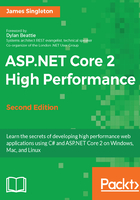
SQL
First off, we will cover SQL-related issues. So, if you're not using a relational database, you can skip this bit; for example, if you use a NoSQL store or a document database instead. Relational databases are a very mature technology and are flexible in their uses. However, it is essential to have a basic knowledge of the SQL syntax and how databases work in order to use them effectively. Even Azure Cosmos DB (previously known as DocumentDB) has an optional SQL API.
It can be tempting when using an O/RM tool, such as Entity Framework (EF), to ignore SQL and stay in the C# world; however, a competent developer should be able to write a high-performance SQL query. Ignoring the realities of how a database engine works will often lead to performance issues. It's easy to write code with an O/RM tool that's too chatty with the database and issues far too many queries for an operation. Not having the correct indexes on a table will also result in poor performance.
During development, you may not notice these mistakes, unless you use tools to identify the inefficient events that occur. Here, we will show you a couple of ways of doing this.